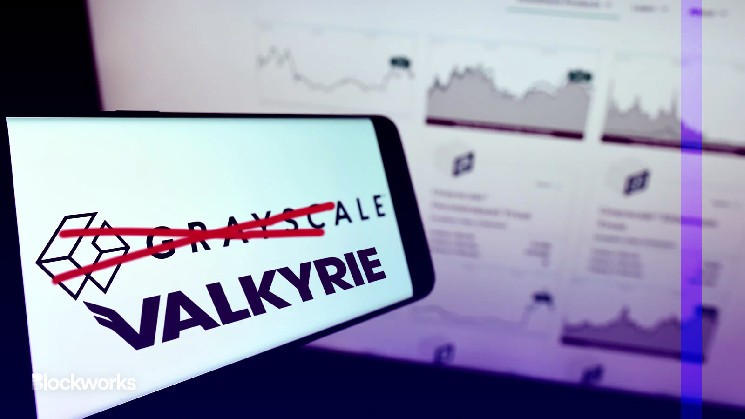Justin Sun-related Valkyrie Wants to Take on Grayscale Bitcoin Trust

In a move dubbed a longshot by institutional crypto investors and market-makers, crypto asset manager Valkyrie Investments has stepped in as the latest potential savior of Grayscale Investment’s embattled bitcoin trust.
Valkyrie’s proposal, issued on Wednesday, touted the purported success of its own — significantly smaller — bitcoin trust in making the case for taking over Grayscale’s GBTC as its new “sponsor and manager,” according to the public letter attributed to the firm’s chief executive.
The first step of any potential takeover appears to be the launch of a new hedge fund, Valkyrie Opportunistic Fund. Valkyrie CEO Steven McClurg positioned the launch of the opportunistic vehicle at the latest market entrant looking to capitalize on the “massive discount” between GBTC’s net asset value (NAV) and its underlying spot bitcoin holdings.
McClurg’s move presents one fresh alternative to Grayscale’s attempts to narrow that gap. The firm, led by CEO Michael Sonneshein, has been engaged in a legal battle with the SEC in a bid to convert the trust to an ETF — which the US securities regulator has batted down.
Sonnenshein’s firm, the largest public bitcoin owner in the world, has so far rebuffed other investor proposals, including filing for a Regulation M with the SEC, which would introduce redemptions for its investors.
In his own public letter, Sonnenshein entertained the notion of rendering a tender offer to GBTC holders, another mechanism to increase liquidity. A spokesperson for Grayscale did not immediately return a request for comment, and a Valkyrie spokesperson was not immediately available for comment.
Two sources familiar with the operations of both firms, and granted anonymity to discuss sensitive business dealings, cast doubt on Valkyrie’s ability to pull off the ambitious bid — even with GBTC now trading at a discount of -47.33% through Thursday’s close.
Deep-pocketed asset managers, including longtime TradFi hedge fund firm Fir Tree Capital, have gotten in on the push for solutions, too.
The Justin Sun connection
Justin Sun, a Chinese national and the founder of the Tron blockchain, was described as the owner of the “vast majority” of assets held by Valkyrie In a recent report from crypto news outlet CoinDesk.
According to the report, Sun held “90% of money at Valkyrie’s largest division, Valkyrie Digital Assets LLC”. Blockworks has not seen the document which CoinDesk used to source its report. CoinDesk reported the total amount of Justin Sun’s assets held as being in excess of $580 million in August.
Sun is listed as an investor in Valkyrie on Crunchbase, and has spoken of the asset manager on Twitter. Valkyrie also runs a TRON trust.
Sun has also earned a reputation as a publicity-seeking entrepreneur who frequently inserts himself into trending conversations in the cryptocurrency world.
Valkyrie’s proposal includes a discount on fees
Valkyrie’s own product has had no liquidity issues since its inception at the start of 2021, the company said.
McClurg, who also serves as Valkyrie’s chief investment officer, touted his team’s experience with close-ended funds in the letter, as a differentiator from the traditional finance world in terms of taking over GBTC.
The proposal outlines a number of mechanisms to “improve upon the current management of GBTC,” including: filing a Regulation M with the SEC to facilitate redemptions from the trust’s investors; slashing its fees to a “more equitable level;” and trying to set up a redemption mechanism that would offer both bitcoin and cash options to GBTC investors.
The proposed fees would clock in at 75 basis points, a steep discount from the trust’s current 2% charge.
An institutional crypto trading source familiar with the matter said Valkyrie appears to be “going for headlines” with the surprise move — mainly because of the firm’s paltry assets under management versus the industry goliath Grayscale.Via its fund management arm exclusively, Valkyrie Funds, the investment manager oversaw a scant $51.1 million of discretionary assets as of September, the most recent data available.
“They have .0001 % chance of doing anything,” the source said.






 Bitcoin
Bitcoin  Ethereum
Ethereum  Tether
Tether  USDC
USDC  TRON
TRON  Dogecoin
Dogecoin  Cardano
Cardano  Bitcoin Cash
Bitcoin Cash  Chainlink
Chainlink  Monero
Monero  LEO Token
LEO Token  Stellar
Stellar  Zcash
Zcash  Litecoin
Litecoin  Hedera
Hedera  Dai
Dai  Cronos
Cronos  Tether Gold
Tether Gold  OKB
OKB  Ethereum Classic
Ethereum Classic  KuCoin
KuCoin  Cosmos Hub
Cosmos Hub  Gate
Gate  Algorand
Algorand  VeChain
VeChain  Stacks
Stacks  Tezos
Tezos  TrueUSD
TrueUSD  Dash
Dash  IOTA
IOTA  Basic Attention
Basic Attention  Theta Network
Theta Network  Decred
Decred  NEO
NEO  Synthetix
Synthetix  Qtum
Qtum  Ravencoin
Ravencoin  0x Protocol
0x Protocol  DigiByte
DigiByte  Zilliqa
Zilliqa  Nano
Nano  Siacoin
Siacoin  Numeraire
Numeraire  Waves
Waves  Status
Status  Ontology
Ontology  Enjin Coin
Enjin Coin  Hive
Hive  BUSD
BUSD  Pax Dollar
Pax Dollar  Lisk
Lisk  Steem
Steem  Huobi
Huobi  OMG Network
OMG Network  NEM
NEM  Bitcoin Gold
Bitcoin Gold  Augur
Augur  Bitcoin Diamond
Bitcoin Diamond